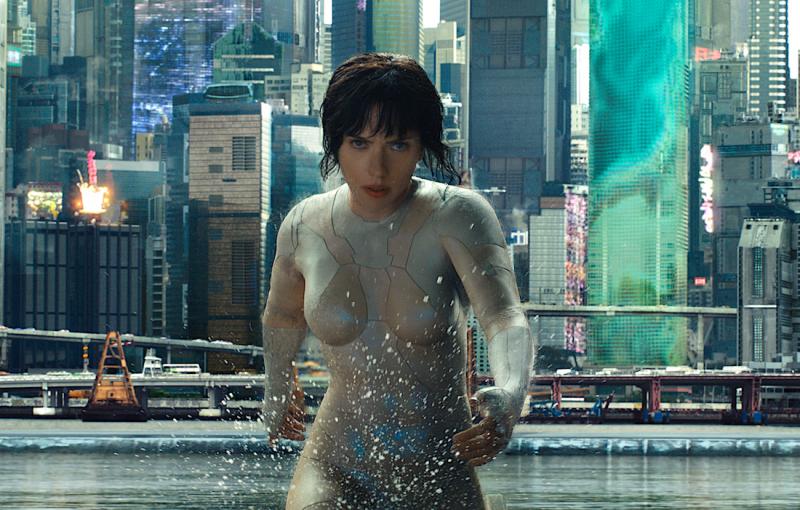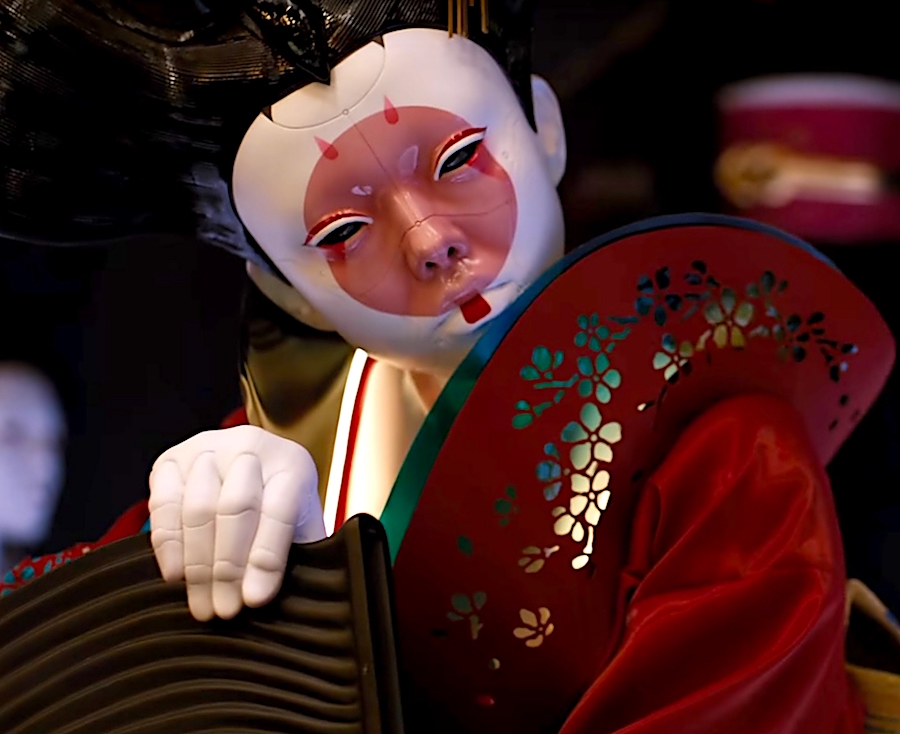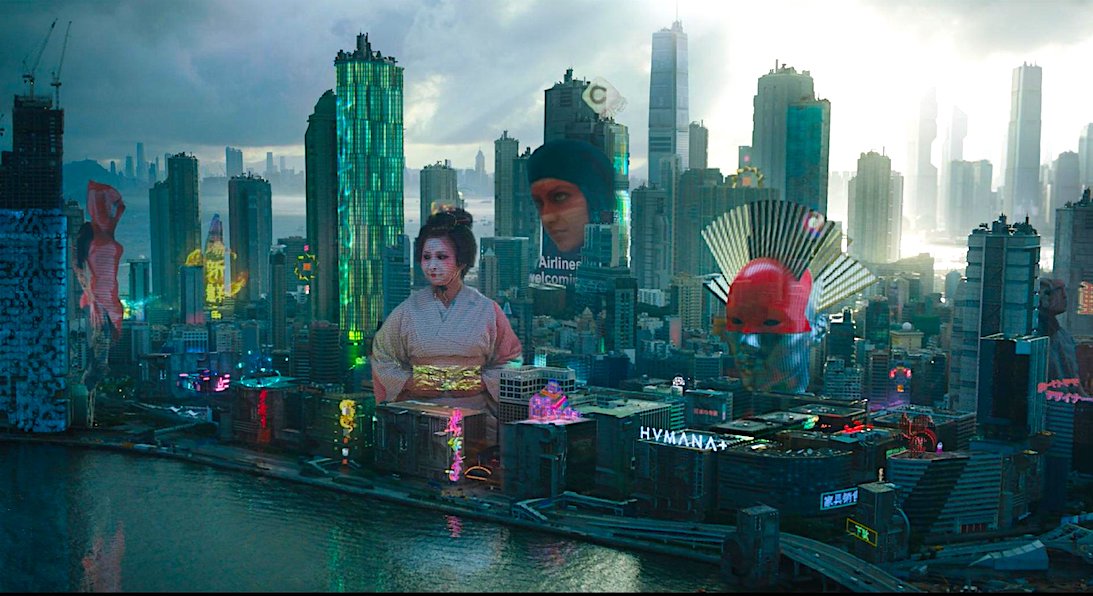Ghost in the Shell review - 'a mind-bending futuristic dystopia' | reviews, news & interviews
Ghost in the Shell review - 'a mind-bending futuristic dystopia'
Ghost in the Shell review - 'a mind-bending futuristic dystopia'
Japanese manga phenomenon gets the Hollywood treatment

The Japanese Ghost in the Shell phenomenon is celebrating its 25th birthday, and already has a long history in manga cartoons and animated movies.
There’s been some controversy about the casting of Scarlett Johansson as the central character, The Major, with some onlookers contending that it’s an outrage to hire a Caucasian superstar instead of a Japanese actress. Others (including Mamoru Oshii, who directed the 1995 Japanese anime version) say the argument is ridiculous, since the story is all about a woman whose consciousness has been transplanted into a wholly synthetic cyborg body, not conforming to any particular nationality (Geisha-bot, below).
 Whatever, Johansson got the gig, and as the special-ops super-agent of the elite government department Section 9 she does a perfectly respectable job of battling with all manner of sinister and mysterious adversaries. She does this by leaping off massive skyscrapers, diving in slow motion through plate-glass windows, becoming invisible, riding monster-sized motorcycles and so on. Luckily she’s had training in this sort of thing as Black Widow in Marvel’s Avengers series.
Whatever, Johansson got the gig, and as the special-ops super-agent of the elite government department Section 9 she does a perfectly respectable job of battling with all manner of sinister and mysterious adversaries. She does this by leaping off massive skyscrapers, diving in slow motion through plate-glass windows, becoming invisible, riding monster-sized motorcycles and so on. Luckily she’s had training in this sort of thing as Black Widow in Marvel’s Avengers series.
But Ghost in the Shell carries a philosophical message alongside its slam-bang action and infinite arsenal of computerised effects. In Blade Runner style, it poses the large philosophical question of where technology ends and human consciousness begins. The Major, as far as she’s aware, suffered catastrophic injuries when the boat carrying her and her refugee family was attacked by terrorists. She woke up to find herself in the tender care of Dr Ouelet (Juliette Binoche), who had supervised the process of installing her human mind in a newly-created body. However, whether she liked it or not, her destiny was to be weaponised by Mr Cutter (Peter Ferdinando), the ruthless boss of Hanka Robotics, the huge corporation which equipped her with a new body.
All of this takes place within a dazzling but soulless city, a futuristic dystopia shrouded in an atmosphere of foreboding and run, as far as one can tell, like a military dictatorship (echoes of The Matrix or Robocop or the Terminator movies rumble through the film like distant thunder). Basically it looks like Hong Kong – with recognisable landmarks like the China Bank building – with loads of computer-added extras, including forests of futuristic skyscrapers with huge holographic figures (the shape of advertising to come) walking between them (pictured below). In classic comic-book style there’s also a dark and lawless side of town, where, it turns out, The Major (or Motoko Kusanagi, as she then was) used to hang with a crowd of rebellious, anarchic low-lifes.
 Her human-brain-in-a-synthetic-body configuration apparently makes her unique, though a problem with the movie is that it becomes impossible to tell who, if anyone, is totally homo sapiens. Dr Ouelet and Aramaki (Beat Takeshi), the battle-scarred boss of Section 9, appear to be, but other characters who seem to be flesh and blood will suddenly surprise you by, for instance, casually detaching a section of their head. Batou, The Major’s gruff combat buddy (played by Pilou Asbaek, the spin-doctor from Borgen), decides to enhance his effectiveness by having a new pair of high-definition eyes installed.
Her human-brain-in-a-synthetic-body configuration apparently makes her unique, though a problem with the movie is that it becomes impossible to tell who, if anyone, is totally homo sapiens. Dr Ouelet and Aramaki (Beat Takeshi), the battle-scarred boss of Section 9, appear to be, but other characters who seem to be flesh and blood will suddenly surprise you by, for instance, casually detaching a section of their head. Batou, The Major’s gruff combat buddy (played by Pilou Asbaek, the spin-doctor from Borgen), decides to enhance his effectiveness by having a new pair of high-definition eyes installed.
Perhaps it was unavoidable, therefore, that the film should be conspicuously lacking in human warmth. As the plot develops, and The Major and her comrades track down the enigmatic Kuze (Michael Pitt), who’s waging cyber-war against the Hanka Corporation, a bit of backstory trickles in, and we start to get an idea of how the world came to be like this. The Major learns that memories may only be synthetic implants designed to deceive, but “what we do defines us”. The quest for the elusive truth will doubtless inform what threatens to become a new blockbuster sci-fi franchise.
The future of Arts Journalism
You can stop theartsdesk.com closing!
We urgently need financing to survive. Our fundraising drive has thus far raised £49,000 but we need to reach £100,000 or we will be forced to close. Please contribute here: https://gofund.me/c3f6033d
And if you can forward this information to anyone who might assist, we’d be grateful.

Subscribe to theartsdesk.com
Thank you for continuing to read our work on theartsdesk.com. For unlimited access to every article in its entirety, including our archive of more than 15,000 pieces, we're asking for £5 per month or £40 per year. We feel it's a very good deal, and hope you do too.
To take a subscription now simply click here.
And if you're looking for that extra gift for a friend or family member, why not treat them to a theartsdesk.com gift subscription?
more Film
 After the Hunt review - muddled #MeToo provocation
Julia Roberts excels despite misfiring drama
After the Hunt review - muddled #MeToo provocation
Julia Roberts excels despite misfiring drama
 Ballad of a Small Player review - Colin Farrell's all in as a gambler down on his luck
Conclave director Edward Berger swaps the Vatican for Asia's sin city
Ballad of a Small Player review - Colin Farrell's all in as a gambler down on his luck
Conclave director Edward Berger swaps the Vatican for Asia's sin city
 London Film Festival 2025 - Bradley Cooper channels John Bishop, the Boss goes to Nebraska, and a French pandemic
... not to mention Kristen Stewart's directing debut and a punchy prison drama
London Film Festival 2025 - Bradley Cooper channels John Bishop, the Boss goes to Nebraska, and a French pandemic
... not to mention Kristen Stewart's directing debut and a punchy prison drama
 London Film Festival - from paranoia in Brazil and Iran, to light relief in New York and Tuscany
'Jay Kelly' disappoints, 'It Was Just an Accident' doesn't
London Film Festival - from paranoia in Brazil and Iran, to light relief in New York and Tuscany
'Jay Kelly' disappoints, 'It Was Just an Accident' doesn't
 Iron Ladies review - working-class heroines of the Miners' Strike
Documentary salutes the staunch women who fought Thatcher's pit closures
Iron Ladies review - working-class heroines of the Miners' Strike
Documentary salutes the staunch women who fought Thatcher's pit closures
 Blu-ray: The Man in the White Suit
Ealing Studios' prescient black comedy, as sharp as ever
Blu-ray: The Man in the White Suit
Ealing Studios' prescient black comedy, as sharp as ever
 The Woman in Cabin 10 review - Scandi noir meets Agatha Christie on a superyacht
Reason goes overboard on a seagoing mystery thriller
The Woman in Cabin 10 review - Scandi noir meets Agatha Christie on a superyacht
Reason goes overboard on a seagoing mystery thriller
 London Film Festival 2025 - crime, punishment, pop stars and shrinks
Daniel Craig investigates, Jodie Foster speaks French and Colin Farrell has a gambling habit
London Film Festival 2025 - crime, punishment, pop stars and shrinks
Daniel Craig investigates, Jodie Foster speaks French and Colin Farrell has a gambling habit
 I Swear review - taking stock of Tourette's
A sharp and moving tale of cuss-words and tics
I Swear review - taking stock of Tourette's
A sharp and moving tale of cuss-words and tics
 A House of Dynamite review - the final countdown
Kathryn Bigelow's cautionary tale sets the nuclear clock ticking again
A House of Dynamite review - the final countdown
Kathryn Bigelow's cautionary tale sets the nuclear clock ticking again
 theartsdesk Q&A: Idris Elba on playing a US President faced with a missile crisis in 'A House of Dynamite'
The star talks about Presidential decision-making when millions of lives are imperilled
theartsdesk Q&A: Idris Elba on playing a US President faced with a missile crisis in 'A House of Dynamite'
The star talks about Presidential decision-making when millions of lives are imperilled

Add comment